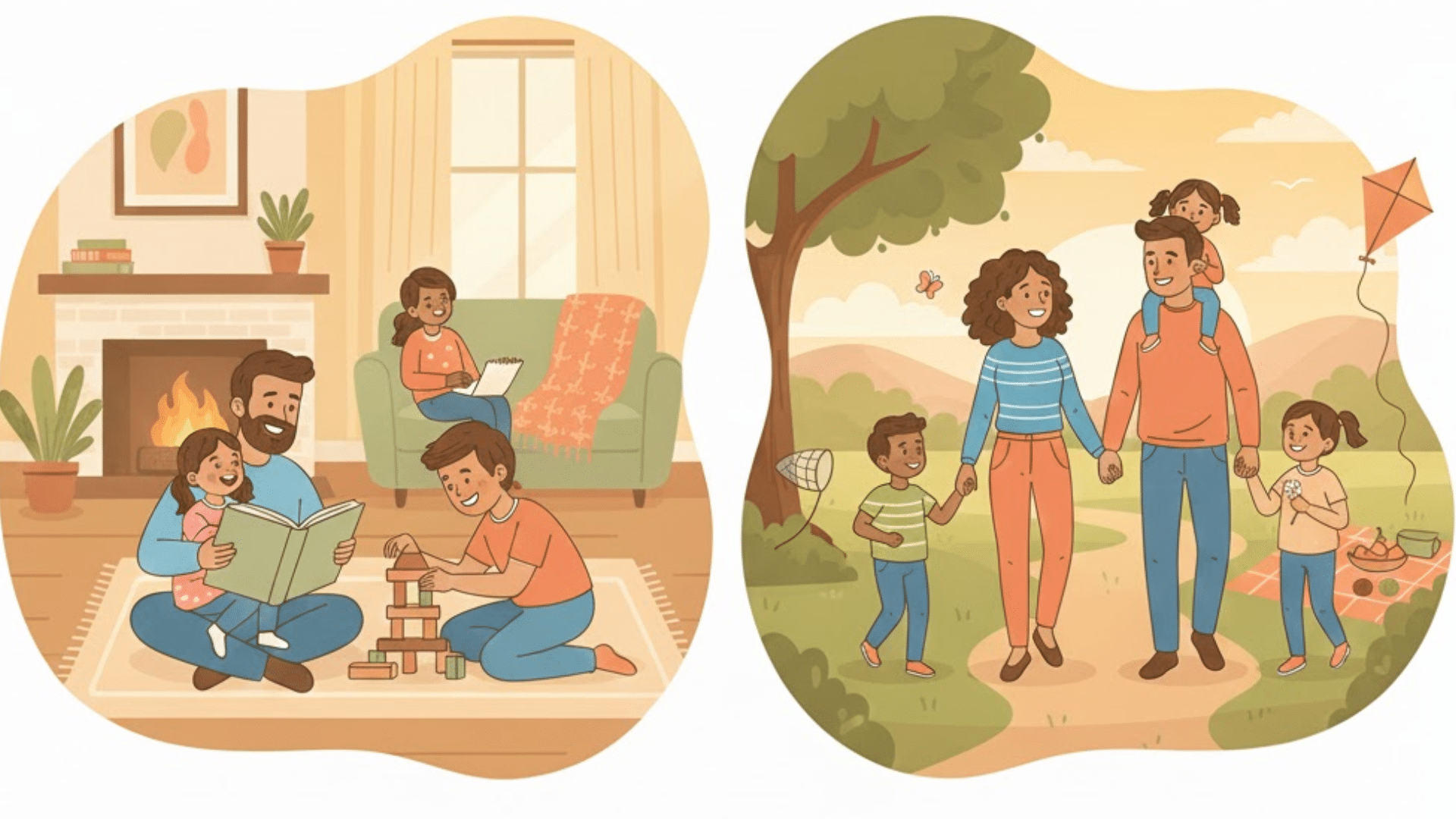Have you ever felt like you’re not doing enough as a mom? You’re not alone. So many mothers feel pressured to do it all, to be patient, organized, and endlessly giving. But the truth is, no one gets it perfect.
Being a good mom isn’t about doing everything right; it’s about showing love, staying patient, and growing along the way.
Some days will feel easy, others will test your limits, and that’s completely normal. What matters most is that you keep showing up with love and effort.
In this blog, you’ll learn how to be a better mom with simple strategies, mindset shifts, and self-care tips to help you feel more confident and balanced without chasing perfection.
What Does It Mean to Be a Good Mother?

Being a good mother doesn’t mean being perfect. Every family is different, and so is every child. What works for one may not work for another, and that’s completely okay.
A good mother focuses on what her child truly needs: love, consistency, emotional safety, and respect. These values create a strong foundation for a happy and secure child.
- Love gives your child the confidence to scan the world.
- Consistency helps them feel safe and know what to expect.
- Emotional safety lets them share their thoughts without fear.
- Respect teaches them to value others and themselves.
Good mothers also learn and grow with their children. They make mistakes, reflect, and try again. Parenting is a journey that changes as kids grow, and flexibility makes a big difference.
Most importantly, being a good mother starts with caring for yourself. When you rest, recharge, and feel supported, you have more patience and energy to give your child the love and attention they deserve.
Practical Tips on How to Be a Good Mother

Being a good mother isn’t about perfection; it’s about showing love, patience, and effort in the little things you do every day. Let’s discuss some tips.
Building Emotional Connection
A strong emotional bond is the heart of motherhood. It helps your child feel safe, loved, and confident. When you take time to connect emotionally, your child learns to trust you and feels supported through every stage of growing up.
1. Listen More Than You Speak
Listening is one of the most powerful ways to show love. When your child talks, give them your full attention, put away distractions, make eye contact, and truly listen.
Ask gentle questions like, “How did that make you feel?” instead of giving quick advice. When children feel heard, they open up more easily and learn that their thoughts and feelings matter.
2. Show Love Through Actions
Children feel love through your everyday actions. A hug before school, a smile during playtime, or sitting beside them while they do homework can mean a lot.
Simple gestures and kind words like “I’m proud of you” or “I love spending time with you” help your child feel safe, loved, and valued. What truly matters is your steady presence, not perfection.
3. Open Communication
Keep communication open and honest. Let your child know they can talk to you about anything without fear of judgment. Stay calm and listen, even when you don’t agree, and respond with empathy.
When they know you’ll listen with care, they’ll trust you with their thoughts and feelings, especially during tough times.
Setting the Right Example
Children learn more from what they see than what they’re told. Your honesty, patience, and kindness in daily life teach lessons that words alone never could.
7. Be Honest and Apologize When You’re Wrong
Admitting your mistakes shows strength, not weakness. When you say “I’m sorry,” you teach your child that honesty matters and that taking responsibility builds trust.
This openness helps them feel safe to be honest, too. It also reminds them that love isn’t about being perfect, it’s about being real.
8. Stay Positive and Show Gratitude
Your attitude sets the tone at home. Showing appreciation for small things and staying calm in difficult moments teaches your child optimism and patience.
Gratitude helps them see life with a hopeful and kind heart. Even on tough days, finding one good thing together keeps the mood bright.
9. Show Kindness and Respect to Others
The way you treat people leaves a deep impression. Speak kindly, show patience, and treat others with respect.
Your child will mirror that behavior and learn empathy through your actions. Every moment is a chance to show them what compassion looks like.
Fostering Growth and Independence
As children grow, they need the freedom to scan, make choices, and learn from their mistakes. Encouraging independence helps them build confidence, responsibility, and problem-solving skills that prepare them for life.
10. Let Them Try and Fail
Mistakes are learning opportunities. Let your child make small errors and figure out solutions with your guidance. This helps them build problem-solving skills and resilience.
When they rise after failing, they grow stronger every time. Each setback becomes a chance for them to learn patience and perseverance.
11. Celebrate Effort, Not Just Success
Praise persistence and hard work instead of focusing only on results. When you recognize effort, your child learns that progress matters more than perfection.
It motivates them to keep trying, even when things get tough. Acknowledging their effort builds confidence and a lifelong love for learning.
12. Teach Responsibility Through Daily Tasks
Give your child small responsibilities like helping in the kitchen or tidying their space. Completing these tasks builds confidence, independence, and a sense of contribution.
These habits create pride in their efforts and teach teamwork naturally. Over time, they learn that responsibility brings both trust and self-respect.
Practicing Patience and Positive Discipline
Discipline isn’t about control; it’s about guidance. Staying calm, consistent, and patient helps your child learn self-control and respect. Positive discipline builds a sense of fairness and trust between you and your child.
13. Respond, Don’t React
Take a breath before correcting your child. Staying calm helps you respond thoughtfully instead of out of frustration, setting a strong example for emotional control.
Patience in hard moments teaches them how to manage their own feelings. When you respond with calmness, you show them that love and understanding always come before anger.
14. Set Clear Boundaries
Children thrive on structure. Explain rules clearly and enforce them calmly so they understand both limits and consequences.
Boundaries give them a sense of safety and consistency. When rules are fair and firm, children learn trust and respect.
15. Use Positive Reinforcement
Notice good behavior and acknowledge it. A simple “I love how you helped your sister” motivates more positive actions and builds confidence. Praise reminds them that effort and kindness are always noticed.
Practicing positive discipline shows your child that love and structure can exist together; it builds confidence, trust, and self-awareness.
Taking Care of Yourself
A happy, calm mom makes for a peaceful home. Taking care of yourself isn’t selfish; it’s essential. When you rest and recharge, you can show up with more patience, energy, and love for your child.
16. Make Time for Self-Care
Set aside a few minutes daily for something that relaxes or recharges you. A peaceful mom creates a peaceful home.
Even a short break helps you return with more patience and warmth. Caring for yourself teaches your child that rest and balance are just as important as hard work.
17. Ask for Help Without Guilt
Reach out to friends or family when needed. Accepting help lightens your load and models healthy teamwork for your child. It also reminds you that motherhood isn’t meant to be done alone.
Letting others support you shows your child that strength often comes from community, not doing everything alone.
18. Let Go of Comparison and Mom Guilt
Focus on what works for your family instead of comparing yourself to others. Perfection isn’t possible; being loving and present is enough. Your child needs your heart, not your perfection.
Taking care of yourself helps you stay centered and calm, giving your child the best version of you every day.
Creating Joyful Family Moments
Joyful memories don’t come from perfection; they come from connection. Simple moments like laughing, playing, or talking together make your home feel warm and safe.
19. Spend Quality Time Together
Give your full attention during small daily moments like meals or bedtime talks. It shows your child that they matter more than anything else.
Even a few minutes of focused time each day makes them feel deeply loved.
These moments remind them that love is shown through time and presence, not perfection.
20. Laugh, Play, and Be Present
Play builds connection and helps ease everyday stress. Laughter makes your home a place where they’ll always feel safe to be themselves.
When you laugh with your child, you teach them that joy can be found in the simplest moments. Join in their games, be silly, and laugh together.
21. Express Love Often
Say “I love you” regularly and show affection through hugs, smiles, and kind words. Simple gestures create lasting emotional security. When love is spoken of often, it becomes a steady comfort they’ll never forget.
Creating joyful family moments is about being present and sharing laughter. Those small, loving moments become the memories your child will treasure forever.
Challenges Mothers Commonly Face
- Balancing Responsibilities: Juggling work, home, and family can feel overwhelming. Learning to prioritize and delegate helps you stay grounded. True balance means focusing on what matters most.
- Societal Pressure and Unrealistic Expectations: Many mothers feel pressured to be perfect in every role. Comparing yourself to others only adds guilt. Focus on your child’s happiness and your own peace instead.
- Mom Guilt and Self-Doubt: It’s normal to question your parenting choices or feel guilty for needing rest. Remember, love and effort matter far more than doing everything perfectly.
- Emotional and Mental Fatigue: Parenting takes endless emotional energy. Without breaks or self-care, burnout can creep in. Resting your mind helps you stay patient and present with your family.
- Adapting as Children Grow: Each stage of childhood brings new needs and lessons. Staying flexible helps you adjust, connect, and grow together with your child through every phase.
Motherhood isn’t about doing everything right; it’s about showing love, patience, and grace as you grow alongside your child. Every challenge shapes you into a stronger, wiser parent.
Conclusion
Being a good mother isn’t about having all the answers or getting everything right. It’s about showing up with love, patience, and the willingness to try again every single day.
The little moments matter most: the hugs after a hard day, the laughter during bedtime stories, and the quiet support when things don’t go as planned.
Motherhood is a mix of learning, growing, and forgiving yourself along the way. So give yourself grace. Celebrate the small wins like the smiles you bring, the comfort you give, and the lessons you teach just by being there.
“Good mothers aren’t perfect, they’re real, loving, and always trying.”










